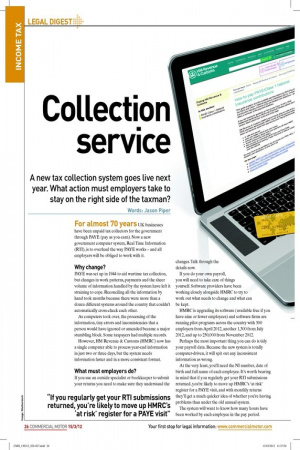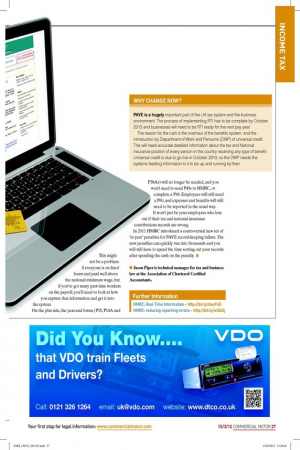Collection service
Page 16

Page 17

If you've noticed an error in this article please click here to report it so we can fix it.
A new tax collection system goes live next year. What action must employers take to stay on the right side of the taxman?
Words: Jason Piper For almost 70 years UK businesses have been unpaid tax collectors for the government through PAYE (pay as you earn). Now a new government computer system, Real Time Information (RTI), is to overhaul the way PAYE works – and all employers will be obliged to work with it.
Why change?
PAYE was set up in 1944 to aid wartime tax collection, but changes in work patterns, payments and the sheer volume of information handled by the system have left it straining to cope. Reconciling all the information by hand took months because there were more than a dozen different systems around the country that couldn’t automatically cross-check each other.
As computers took over, the processing of the information, tiny errors and inconsistencies that a person would have ignored or amended became a major stumbling block. Some taxpayers had multiple records.
However, HM Revenue & Customs (HMRC) now has a single computer able to process year-end information in just two or three days, but the system needs information faster and in a more consistent format.
What must employers do?
If you use an outside specialist or bookkeeper to submit your returns you need to make sure they understand the changes. Talk through the details now.
If you do your own payroll, you will need to take care of things yourself. Software providers have been working closely alongside HMRC to try to work out what needs to change and what can be kept.
HMRC is upgrading its software (available free if you have nine or fewer employees) and software irms are running pilot programs across the country with 300 employers from April 2012, another 1,300 from July 2012, and up to 250,000 from November 2012.
Perhaps the most important thing you can do is tidy your payroll data. Because the new system is totally computer-driven, it will spit out any inconsistent information as wrong.
At the very least, you’ll need the NI number, date of birth and full name of each employee. It’s worth bearing in mind that if you regularly get your RTI submissions returned, you’re likely to move up HMRC’s ‘at risk’ register for a PAYE visit, and with monthly returns they’ll get a much quicker idea of whether you’re having problems than under the old annual system.
The system will want to know how many hours have been worked by each employee in the pay period. This might not be a problem if everyone is on ixed hours and paid well above the national minimum wage, but if you’ve got many part-time workers on the payroll, you’ll need to look at how you capture that information and get it into the system.
On the plus side, the year-end forms (P35, P14A and P38As) will no longer be needed, and you won’t need to send P45s to HMRC, or complete a P46. Employees will still need a P60, and expenses and beneits will still need to be reported in the usual way. It won’t just be your employees who lose out if their tax and national insurance contributions records are wrong.
In 2011 HMRC introduced a controversial new set of ‘in year’ penalties for PAYE record-keeping failure. The new penalties can quickly run into thousands and you will still have to spend the time sorting out your records after spending the cash on the penalty. n ● Jason Piper is technical manager for tax and business law at the Association of Chartered Certiied Accountants.
Further Information
HMRC: Real Time Information – http://bit.ly/AuyF4E HMRC: reducing reporting errors – http://bit.ly/w56I2j
WHY CHANGE NOW?
PAYE is a hugely important part of the UK tax system and the business environment. The process of implementing RTI has to be complete by October 2013 and businesses will need to be RTI ready for the next pay year.
The reason for the rush is the overhaul of the benefits system, and the introduction by Department of Work and Pensions (DWP) of universal credit. This will need accurate detailed information about the tax and National insurance position of every person in the country receiving any type of benefit. Universal credit is due to go live in October 2013, so the DWP needs the systems feeding information to it to be up and running by then.




































